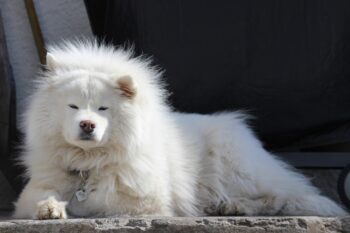Samoyeds, known for their fluffy white coats and trademark “Sammy smile,” are one of the most beloved dog breeds. They are friendly, energetic, and make great companions. However, like many dog breeds, Samoyeds are surrounded by various myths that can mislead potential owners or even current Samoyed lovers. Let’s debunk five common myths about Samoyeds that you should stop believing.
Myth 1: Samoyeds Are High-Maintenance Due to Their Thick Coat
The luxurious, fluffy coat of a Samoyed can give the impression that they are high-maintenance dogs that require endless grooming sessions. While it’s true that Samoyeds have a thick double coat, which sheds quite a bit, the belief that they are high-maintenance is somewhat exaggerated.
Fact: Samoyeds do require regular grooming, but they don’t need constant attention. Their double coat consists of a soft undercoat and a coarser outer layer, which means they shed more during the spring and fall. Brushing your Samoyed at least 2-3 times a week is sufficient for most of the year, and during shedding seasons, daily brushing will help manage the fur. Additionally, they naturally have a self-cleaning coat that repels dirt, meaning they don’t need frequent baths. Many owners find that Samoyeds are not as challenging to groom as one might think, especially with the right tools and techniques.
Myth 2: Samoyeds Are Always Happy Because of Their “Sammy Smile”
One of the most recognizable traits of a Samoyed is their ever-present smile. This facial expression, combined with their friendly nature, has led many to believe that Samoyeds are always happy and carefree dogs. The “Sammy smile” makes them appear as though they are constantly cheerful, but this myth oversimplifies their emotional range.
Fact: Samoyeds, like all dogs, experience a wide range of emotions. They can feel anxious, frustrated, or even bored despite their smiling appearance. It’s essential for owners to pay attention to other signals of their Samoyed’s emotional state, such as their body language and behavior. For example, a Samoyed may exhibit signs of anxiety by pacing, whining, or being destructive. While they are a generally joyful and friendly breed, assuming that their smile reflects their mood at all times is misleading. It’s essential to engage them mentally and physically to ensure they’re content and not masking any stress behind their smile.
Myth 3: Samoyeds Are Not Good for Hot Climates Due to Their Thick Coat
Given their origins as sled dogs in Siberia, many assume that Samoyeds can’t handle warm weather due to their thick coat. It’s a common belief that their fluffy fur automatically makes them uncomfortable or even at risk of overheating in hotter climates.
Fact: Samoyeds are quite adaptable to different climates, including warmer ones. Their thick double coat is not just for warmth—it also serves as insulation that protects them from the heat. The outer coat helps reflect sunlight, while the undercoat traps cool air close to their skin. However, it’s essential to keep them cool and hydrated, as no dog should be exposed to extreme heat for extended periods. Ensuring they have access to shade and water and avoiding exercise during the hottest parts of the day are important steps in keeping your Samoyed comfortable in warm weather. Proper grooming is also key, as a well-brushed coat can help regulate their temperature better.
Myth 4: Samoyeds Are Difficult to Train and Stubborn
Another misconception is that Samoyeds are stubborn and hard to train, often because of their independent, working-dog roots. As dogs bred for sledding and herding, they needed to make decisions on their own, which can be mistaken for disobedience or stubbornness.
Fact: Samoyeds are intelligent dogs with a strong work ethic, but they do have an independent streak. This doesn’t mean they are difficult to train, but they do respond best to positive reinforcement and consistent training. Samoyeds thrive on praise, treats, and engaging activities. If training is approached with patience and positivity, they can learn quickly and even excel in obedience, agility, and other dog sports. Early socialization and training are key, and it’s important to keep training sessions fun and rewarding. Boredom or repetitive commands can make them lose interest, so variety and engagement are crucial to keeping a Samoyed focused.
Myth 5: Samoyeds Are Only Suitable as Outdoor Dogs
Because Samoyeds were originally bred to work in harsh, cold environments, some believe that they are outdoor dogs who thrive best when left outside for long periods. Their thick coats and history as working dogs lead to the misconception that they don’t need to be inside with their family.
Fact: While Samoyeds can tolerate cold weather better than many other breeds, they are incredibly social and thrive on human interaction. Samoyeds were traditionally family dogs who worked alongside people and even slept with them to keep warm. They have a strong desire to be part of the family and can suffer from separation anxiety if left alone or isolated for too long. Leaving a Samoyed outside for extended periods can lead to behavioral issues such as excessive barking, digging, or destructive tendencies. Samoyeds are happiest when they can be close to their family and included in daily activities, making them better suited as indoor companions rather than solely outdoor dogs.
Samoyeds are a remarkable breed, full of personality, intelligence, and charm. While their thick coats, friendly expressions, and independent nature have led to several myths about them, it’s important to understand the facts before assuming anything about these lovable dogs. By debunking these myths, we can better appreciate Samoyeds for what they truly are: adaptable, trainable, and affectionate companions who thrive on love, attention, and engagement with their families.
If you are considering adding a Samoyed to your family, make sure to do thorough research, provide them with the proper care, and enjoy the endless joy and companionship they offer.
The post 5 Myths About Samoyeds You Should Stop Believing appeared first on iHeartDogs.com.

